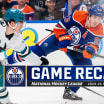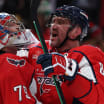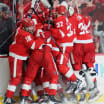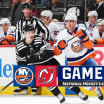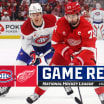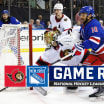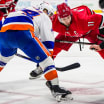Jets don't feel like they've arrived, governor says
Chipman talks about raised expectations, Laine's future in wide-ranging conversation with NHL.com
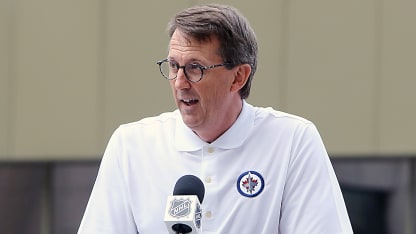
© Jonathan Kozub/Getty Images
RELATED: [Scheifele says it's time for Jets to reach Cup Final]
"We took some important steps last year," Chipman, the governor of the Jets, told NHL.com, "but by no means does anybody in our organization feel like we've arrived."
Chipman, who with partner David Thomson took ownership of the franchise and moved it from Atlanta to Winnipeg in 2011, said he had not allowed himself to envision winning the Stanley Cup until the Jets advanced to the Western Conference Final against the Vegas Golden Knights last season. Winnipeg lost in five games.
"You got a sense in the playoffs of just how meaningful that would be to our fans," he said. "That picture of game-viewing parties [outside Bell MTS Place] on Donald Street, start with that and expand it exponentially and that's what I think the city would look like if we ever won a Cup."
Chipman, whose Jets signed captain Blake Wheeler to five-year, $41.25 million contract on Sept. 4, knows the next big contract could go to forward Patrik Laine, who is entering the final season of his entry-level contract.
"If he continues on this trajectory, he's going to earn himself a very lucrative contract," Chipman said of Laine. "That's the nature of the business."
Chipman discussed his hopes for the Jets this season, the Wheeler contract and Laine's future in an interview with NHL.com
On what a successful 2018-19 season looks like for the Jets: "Making the playoffs. One thing I've learned for sure is that's the hardest part, getting in. I remember [former Los Angeles Kings coach] Darryl Sutter telling me that a few years ago, after the Kings' Stanley Cup success and a conversation I had with him about it. He said getting in, in his experience, was the hardest part, and that proved to be true. That's the trickiest part, the most challenging part, in this League with the competitive balance that exists. That's how I would define success in a season -- getting ourselves back in the playoffs and then hopefully play well again, as we did through the first two rounds last season. It would be great to go deeper. That would be everybody's hope and is each year but to begin with, we have to get ourselves in. I'd define that as success."
On what he and the Jets have done to be ready for the high expectations in Winnipeg: "Talking to you and having the opportunity to convey to people that we're still a relatively young team and still finding our way. We've got a good, young team and we're very well coached and we've stuck to our plan and that's given us some momentum, I suppose. But it's so competitive ... what we're going to do to prepare ourselves to manage expectations is to remind people, starting within our own organization, of that. I talked to a full staff meeting yesterday, reminding them that expectations are higher for us now and it just means we have to be better in everything we do. It may sound trite but it goes from our whole game experience of how our fans are treated from the moment they enter our building to how we perform on the ice. What I'm trying to say is that in this game, if you don't stay humble, it will humble you in a hurry."
On hearing criticism after giving general manager Kevin Cheveldayoff and coach Paul Maurice contract extensions before last season: "It was a little difficult to hear but in the case of [Cheveldayoff], we had agreed to extend his deal early in 2016-17 when we missed the playoffs. And in Paul's case, we were convinced early on as well that he was our guy. Not making the playoffs that year didn't change my mind. I could see we were a work in progress and making progress. And I didn't feel as though a difficult year made them any less qualified. They're the right guys for our organization. I don't remember being overly fussed about it, that people wondered why we were extending them. I don't wish for this to sound the wrong way, but I don't pay a lot of attention to outside views. If I've learned anything, success in this game only comes through patience. I just don't know anybody who's been able to shortcut it. There may be the odd example, but I think success in anything takes a thoughtful plan and then patience, and both Kevin and Paul have been part of that plan."
On if his commitment to patience and stability gets more difficult going forward: "I think it gets harder. There's been some acknowledgement that we've got a plan and we're sticking to it but I'm also not that naive to suggest that if things didn't go well this year, that there could quickly be a lot of criticism and demand for change. I think we're just getting started, to be honest. When I wake up in the morning, I don't go sprinting down the hall thinking we've succeeded. This is a really demanding business and we're just getting started, so patience is going to be essential and maybe even more so, now that we've had a little bit of success. And I stress little.'"
On the significance of Blake Wheeler's contract extension:"What came from this process, what made me feel good about the decision was how desirous Blake was of staying here. That would be an example of examining every aspect of the situation because you have to get those ones right. You're not just talking about a really good hockey player, you're talking about the guy who drives your team, your leader. Our perspective on that was quite unified and wanting to get it right. It was never an issue about his character or ability or fit. It was just a matter of fitting it into a cap structure. Those take time to work through and to anticipate where the salary cap's going and where other players might fit in. It was essential that Blake was a part of our team. Over however many years I've been in this business, you learn certain things and one of them that I think I've come to understand through observation and experience is that there are a lot of factors go into the success of a team. But perhaps the most important ingredient is your captain ... and the extent of his desire to win. Without it, I guess you can pull it off but you're less likely to. Blake represents that for us. He's a stabilizing influence in our whole makeup."
On Patrik Laine's future: "We were extremely fortunate to have drafted Patrik. I don't know what the limits are for Patrik. Obviously his skill is very apparent. I don't think a lot of people understand how difficult it is to play in this League. It's an overused cliché but it's a man's league. You really find that out come playoff time. So to come into this League as an 18-year-old and a 19-year-old and to do what he's done is remarkable. And not just from a skill perspective. Every bit as much from a maturity perspective. Many people underestimate or don't give him enough credit for his mental maturity. It's beyond his years. I only see Patrik getting better as a player because he's necessarily going to continue to mature. I happen to like him a great deal as a person. He's a very nice young man, a humble young man, who's been raised right. His parents are phenomenal people. When I found out they were going to the viewing parties here during our road games during the playoffs, that put a real smile on my face. They're the most unassuming, humble folks you could ever meet. So not surprisingly, Patrik is very, very much the same."

